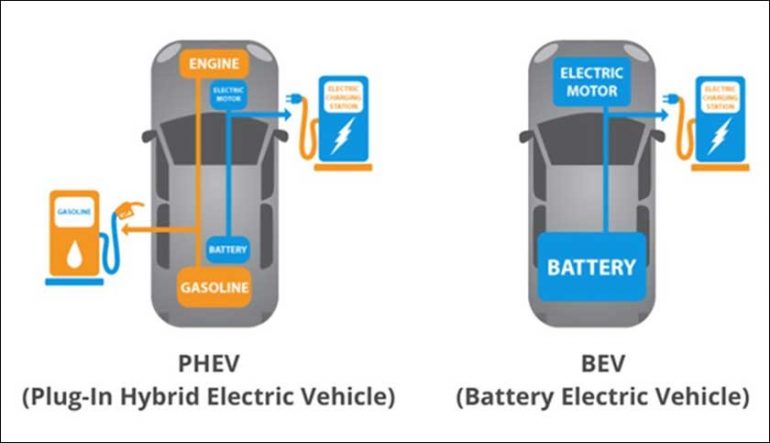As the automotive industry continues to evolve toward sustainability, buyers in 2024 are presented with a wide range of options when it comes to choosing between electric vehicles (EVs) and hybrids. Both of these technologies aim to reduce reliance on fossil fuels and lower carbon emissions, but they do so in different ways, offering distinct advantages and challenges. With growing environmental concerns, rising fuel prices, and advances in vehicle technology, the decision between an EV and a hybrid can be complex.
In this blog, we’ll take a closer look at the key differences between EVs and hybrids, the factors that influence consumer choices in 2024, and which option may be the better choice for buyers.
What Are EVs and Hybrids?
Electric Vehicles (EVs)
Electric vehicles are powered entirely by electricity, stored in large batteries, and use electric motors for propulsion. They don’t rely on gasoline or diesel and are typically charged through home charging stations or public charging networks.
- Zero Emissions: EVs produce no tailpipe emissions, making them the most environmentally friendly option on the market.
- Fully Electric: EVs run solely on electric power, making them ideal for drivers looking to avoid fossil fuels altogether.
Hybrid Vehicles (HEVs)
Hybrid vehicles combine a traditional internal combustion engine (ICE) with an electric motor and battery. The electric motor assists the engine to increase fuel efficiency, but the vehicle still relies on gasoline or diesel to operate.
- Dual Power Sources: Hybrids use both an electric motor and a gas engine. The electric motor is primarily used at low speeds, while the gas engine kicks in at higher speeds or when additional power is needed.
- Better Fuel Economy: Hybrids are designed to optimize fuel efficiency by leveraging electric power, reducing the amount of fuel needed for day-to-day driving.
EVs in 2024: Advantages and Considerations
Electric vehicles have made remarkable strides in recent years, and 2024 is shaping up to be a landmark year for EV adoption. With new models, improved battery technology, and expanded charging networks, EVs are more accessible and practical than ever before.
Advantages of EVs:
- Zero Tailpipe Emissions: The primary environmental benefit of EVs is their zero-emission nature. For eco-conscious consumers, EVs offer a clean alternative to traditional vehicles that contribute to air pollution and climate change.
- Lower Operating Costs: EVs have fewer moving parts compared to internal combustion engine (ICE) vehicles, which translates to lower maintenance costs. No oil changes, fewer brake replacements, and lower overall maintenance make EVs more economical in the long run.
- Government Incentives: In 2024, governments around the world continue to offer incentives for EV buyers, such as tax rebates, subsidies, and reduced registration fees, making EVs more affordable.
- Advances in Range and Charging Infrastructure: Range anxiety, a major concern for early EV adopters, is becoming less of an issue. In 2024, many new electric vehicles can travel over 300 miles on a single charge, and fast-charging stations are becoming more common, reducing charging times to under 30 minutes in many locations.
- Sustainability: EVs are a key solution to reducing a country’s reliance on fossil fuels and are aligned with global efforts to reduce greenhouse gas emissions.
Considerations for EV Buyers:
- Range Limitations: While EVs have made tremendous improvements in range, they still require careful planning for long-distance travel, especially in rural areas with limited charging infrastructure.
- Upfront Cost: Even with government incentives, the initial purchase price of EVs can still be higher than that of traditional gas-powered cars, though this gap is shrinking as more affordable models enter the market.
- Charging Infrastructure: While public charging networks are expanding rapidly, some areas, especially in rural or less developed regions, may still lack sufficient charging stations. Access to home charging is another important consideration for potential EV buyers.
Hybrids in 2024: Advantages and Considerations
Hybrid vehicles have long been a popular choice for those seeking improved fuel efficiency without fully committing to an electric-only vehicle. In 2024, hybrids continue to offer a balanced approach between gasoline and electric power.
Advantages of Hybrids:
- Better Fuel Economy: Hybrids are typically more fuel-efficient than conventional vehicles, offering better mileage by using both the electric motor and gasoline engine to maximize energy efficiency. This makes hybrids a great choice for drivers who want to reduce their carbon footprint without worrying about range.
- No Range Anxiety: Unlike fully electric vehicles, hybrids don’t rely entirely on battery power. If the battery runs out, the gasoline engine kicks in, allowing the vehicle to continue driving without needing to stop for charging.
- Lower Initial Cost: Hybrids are often more affordable than EVs, making them an attractive option for buyers who want better fuel efficiency but are not ready to pay the premium for a fully electric vehicle.
- Widespread Availability of Gas Stations: Since hybrids still rely on gasoline for a portion of their power, fueling infrastructure is not an issue. Drivers can easily refuel at any gas station, which makes hybrids convenient for long-distance trips or areas without sufficient EV charging stations.
- Reduced Environmental Impact: While hybrids are not zero-emission like EVs, they still significantly reduce emissions compared to traditional vehicles. For buyers who are concerned about environmental impact but are not ready to go fully electric, hybrids offer a solid middle ground.
Considerations for Hybrid Buyers:
- Complexity and Maintenance: While hybrids require less maintenance than traditional vehicles, they still have both an internal combustion engine and an electric motor, which can make them more complex and potentially more expensive to repair.
- Limited Electric Range: While hybrids can run on electricity for short distances, they typically have limited all-electric range. They don’t offer the same zero-emission benefits as fully electric vehicles.
- Fuel Costs: While hybrids improve fuel economy, they still require gasoline, and fuel costs can fluctuate. Buyers may find that their long-term savings on fuel are not as significant as they would be with a fully electric vehicle.
EVs vs Hybrids: Which Is Right for You?
The decision between an electric vehicle and a hybrid ultimately depends on your driving needs, budget, and environmental priorities. Here are a few factors to consider when making your choice in 2024:
1. Daily Commute and Driving Range
- If you have a short daily commute and access to a charging station at home, an EV may be the ideal choice, offering a cleaner and more affordable long-term solution.
- If you frequently drive long distances or live in an area with limited charging infrastructure, a hybrid might be the better option, as it doesn’t rely on charging stations and provides greater flexibility for long trips.
2. Environmental Impact
- If you’re focused on minimizing your environmental footprint, an EV is the more eco-friendly choice. It produces zero emissions and contributes directly to reducing reliance on fossil fuels.
- Hybrids, while better for the environment than traditional vehicles, are still partially reliant on gasoline, so they won’t be as effective in reducing emissions as EVs.
3. Budget and Initial Cost
- EVs generally have a higher upfront cost compared to hybrids, though government incentives and falling battery prices are narrowing the gap. However, over time, the lower operating costs and maintenance savings may make EVs more cost-effective in the long run.
- Hybrids tend to be more affordable initially and offer a great balance of fuel efficiency without the higher cost of EVs.
4. Charging and Infrastructure
- If you have access to home charging or live in an area with a robust network of charging stations, an EV is a practical choice. For those in areas where charging infrastructure is still developing, a hybrid may offer the convenience of easy refueling without worrying about charging availability.
Conclusion: The Best Choice for 2024
Both EVs and hybrids offer distinct advantages, and the right choice for you will depend on your specific needs. If you’re looking for an environmentally friendly, low-maintenance vehicle with zero emissions and have access to reliable charging infrastructure, an electric vehicle is an excellent option. On the other hand, if you want a flexible, fuel-efficient vehicle that doesn’t require charging and can accommodate longer trips, a hybrid may be a better fit.
In 2024, as the EV market continues to grow and infrastructure improves, more consumers will likely turn to electric vehicles as their primary mode of transportation. However, hybrids remain an attractive option for buyers seeking a middle ground between traditional gasoline-powered vehicles and fully electric ones.
Ultimately, whether you choose an EV or a hybrid, you’re making a step toward a more sustainable future, contributing to reduced emissions and a cleaner environment.
1




